NewsAssociation
A historic day. Women's football strategy officially unveiled

On Thursday (2 February), the Women's football strategy for 2022-26 was officially unveiled at PGE Narodowy. This is the first document of its kind in the history of Polish football, and its implementation and the fulfilment of its key objectives are expected to contribute to making the development of women's football in our country more dynamic.
The event was originally scheduled to take place in November last year, when the document was adopted by a resolution of the management board of the Polish Football Association (PZPN). However, dozens of hours before the scheduled event, news of a roof failure at PGE Narodowy broke and the official announcement of the strategy had to be postponed. But no failure could stop the federation from acting. And so, while still working on the strategy, a supplement to the National Game Model entitled "Women's Football" was being created, to which a separate block was dedicated at yesterday's event in the form of a conversation with Nina Patalon - women's Polish national team head coach, women's football technical coordinator and one of the eleven authors of the supplement, most of whom were present.
In turn, it was announced in January that PKN Orlen had become the title sponsor of the Ekstraliga, the 1st League and the Polish Women's Cup. This is one more of the activities related to the strategy that did not wait for its official announcement. "PKN Orlen has recognised the potential of women's football. Research shows that it is the fastest growing sport in the world, so no one on our partner's side had to be persuaded to support it," said Łukasz Wachowski, secretary general of PZPN.
Emma Sykes, UEFA's development manager for the sport, also spoke about the almost limitless potential of women's football: "If you look at the increase in the number of girls playing football for fun, women turning professional, the overall number of female players, transfers or sponsors, you come to the conclusion that we still don't really fully realise where the ceiling is. We carried out a study which showed that women's football could grow up to sixfold in the next ten years in terms of commercial growth. This is an extremely optimistic prospect."
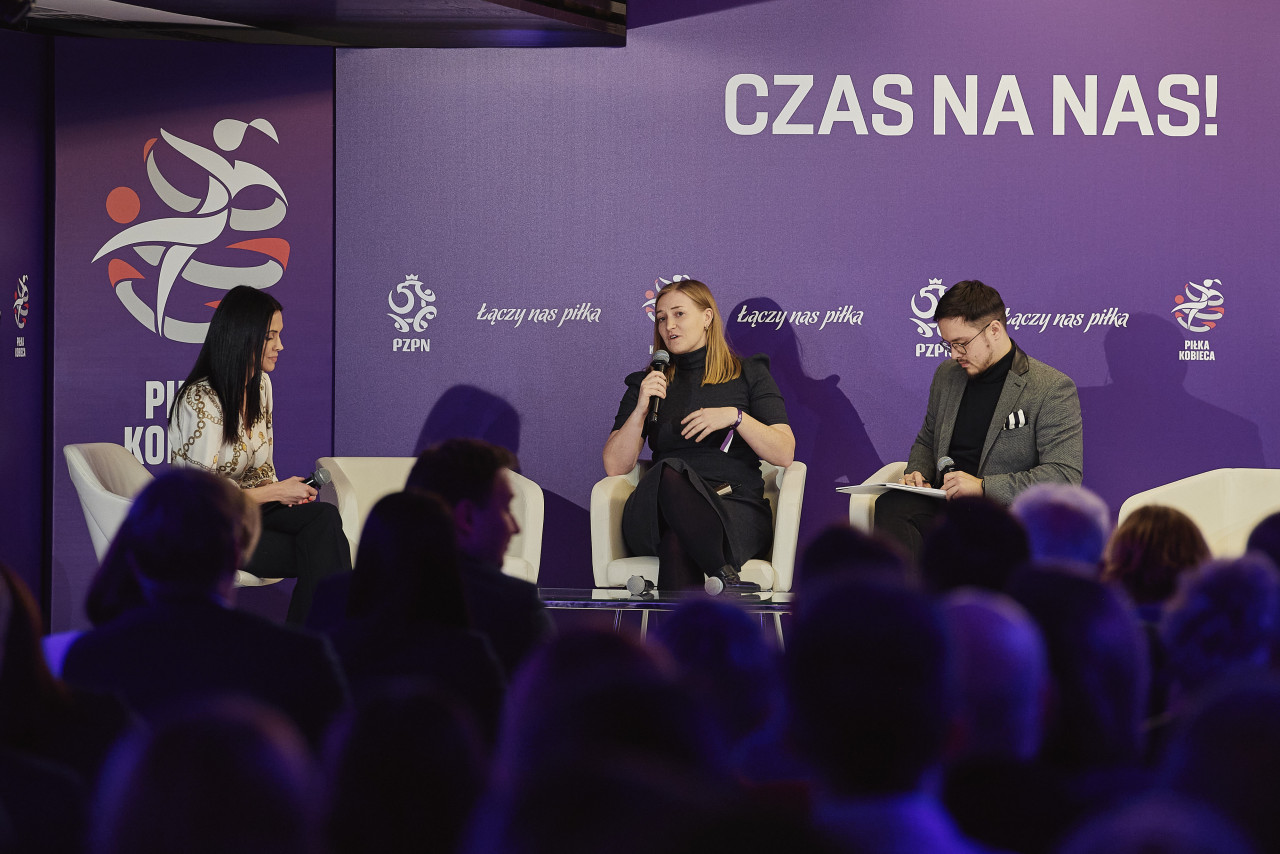
Thursday's event was hosted by TVP Sport journalist Sylwia Dekiert, who began by welcoming all those in attendance, including special guests: Anna Krupka, Secretary of State at the Ministry of Sport and Tourism, representatives of UEFA, FIFA and the management board of the Polish Football Association, whose president - Cezary Kulesza - appeared on stage a moment later: "This is a special and important day for all of Polish football. Women's football is one of the pillars of our business, so the creation of a strategy was necessary to make the development of the sport even more dynamic."
Next, Zuzanna Walczak, women's football development coordinator, took the floor. "It gives me great pleasure to tell you about the months-long strategy process thanks to which we are meeting today. It resulted in the establishment of a mission and vision for Polish women's football. We want to make it a sport where every girl and woman can fulfil herself - not only as a footballer, but also as a coach, referee or football official. In a moment in the panel discussions, we will introduce you to the four main areas of action in the field of women's football," announced Walczak. At the end of her speech, the coordinator of the work on the strategy and research process made a personal confession. "As a little girl I dreamed of playing for the Polish national team. Men's, because I didn't know that other girls were also playing. I didn't know the women's national football team even existed. I believe that, thanks to the strategy, a similar situation will never happen again," she said, drawing applause and emotion from the assembled audience.
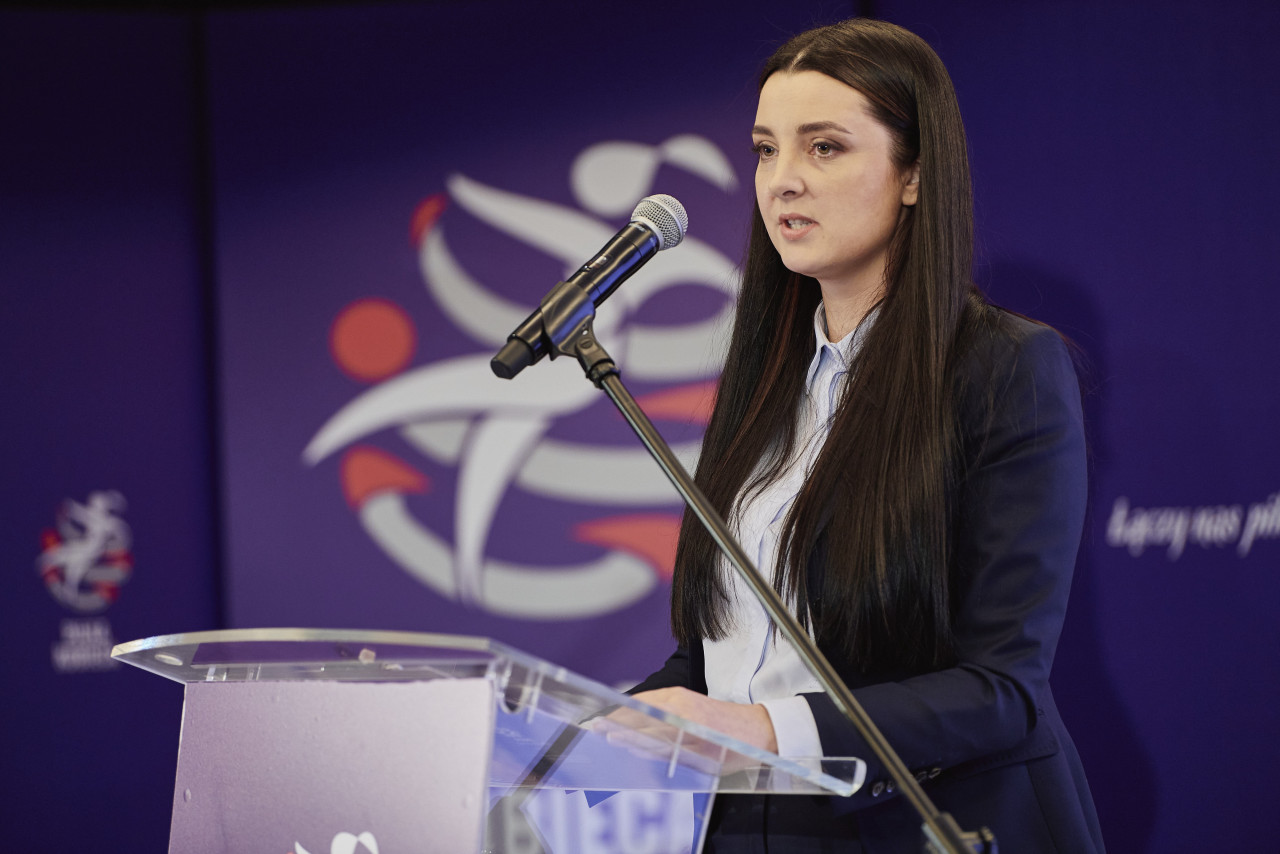
Before the panel discussion began, the audience also listened to a speech by Nadine Kessler - the world's best female footballer of 2014, who now serves as managing director of women's football at UEFA. Nadine was unable to come to PGE Narodowy and her speech was played on video. Kessler started from general topics, such as the development of women's football in Europe, before moving smoothly on to Poland and what is happening in our country in this area: "It is great to see that Poland is one of the countries with its own women's football strategy. I am confident that women's football in your country is in good hands and has a bright future. The Polish Football Association is on an exciting path and I look forward to seeing the results of this work."
A moment later, Emma Sykes appeared next to the presenter to talk about the behind-the-scenes of the launch of UEFA's 2019 football strategy. Previously, women's football developed organically but did not have a defined direction," she said, also referring to Poland. "I have been here several times over the last 12 years and have seen first-hand the progress that is being made in your country. I know that other federations look to Poland as a role model in this area. Your possibilities are among the greatest in Europe. It is an opportunity, and at the same time a responsibility, to develop the whole discipline and individual talents."
How to do it? This was discussed during thematic panels in the four areas identified as priorities in the development of women's football over the next few years. Each panel began with a short thematic video serving as an introduction to the conversation.
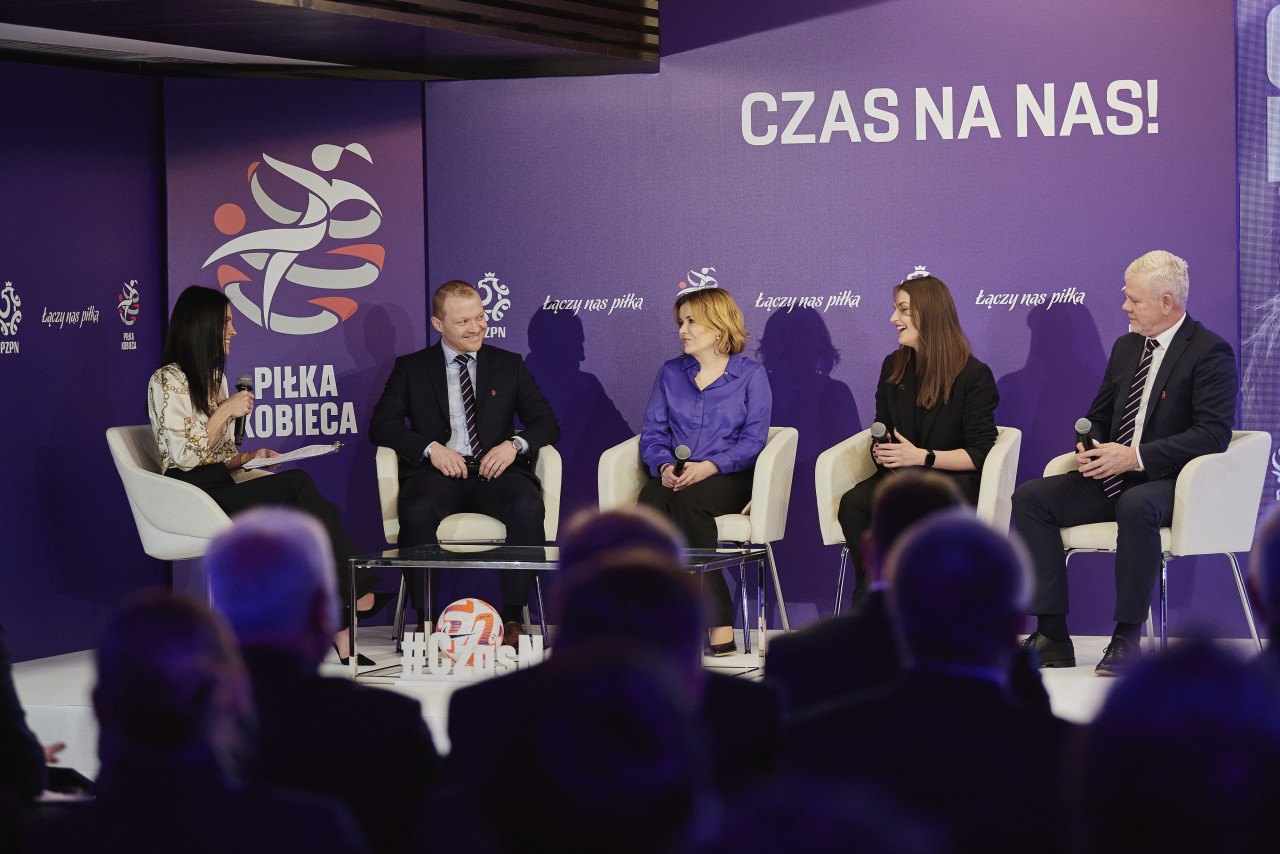
The first panel, on participation, featured the aforementioned Anna Krupka, Adam Kaźmierczak (vice-president of the Polish Football Association for amateur football), Przemysław Prętkiewicz (director of the grassroots department at PZPN) and Klaudia Bodecka (sports psychologist, coach and Legia Warszawa football player).
"Statistics show that physical activity among girls and women in some countries is up to twice as low as among men, which is why it is so important to promote sport in society as a whole. As the Ministry of Sport and Tourism, we place a strong focus on grassroots sport and this year we will allocate a record PLN 504 million to it. This is an increase of 330 per cent compared to 2015," Krupka pointed out.
The panellists emphasised the benefits of playing football from an early age. Bodecka, who works with Legia Soccer Schools' youngest players, highlighted how participation in the UEFA Playmakers programme has had an impact on building confidence among the girls. Prętkiewicz added that football is an excellent tool to shape character, which is why the Polish Football Association's aim is to reach children and their parents as early as possible. "The sooner we show the benefits of playing football, such as the development of soft skills, the greater the chance that physical activity will stay with these children permanently," explained the director of the grassroots department, which organises, among other things, the "From the Backyard to the Stadium – Tymbark Cup" tournament that president Kaźmierczak talked about: "For 23 years, girls and boys have been competing in this competition under exactly the same conditions. We are constantly striving to make the tournament as popular as possible, with thousands of girls from all over the country taking part every year. It was here that many of today's Polish national team players started out, including Ewa Pajor, whom I myself remember from my playing days in the colours of the school from near Uniejów.
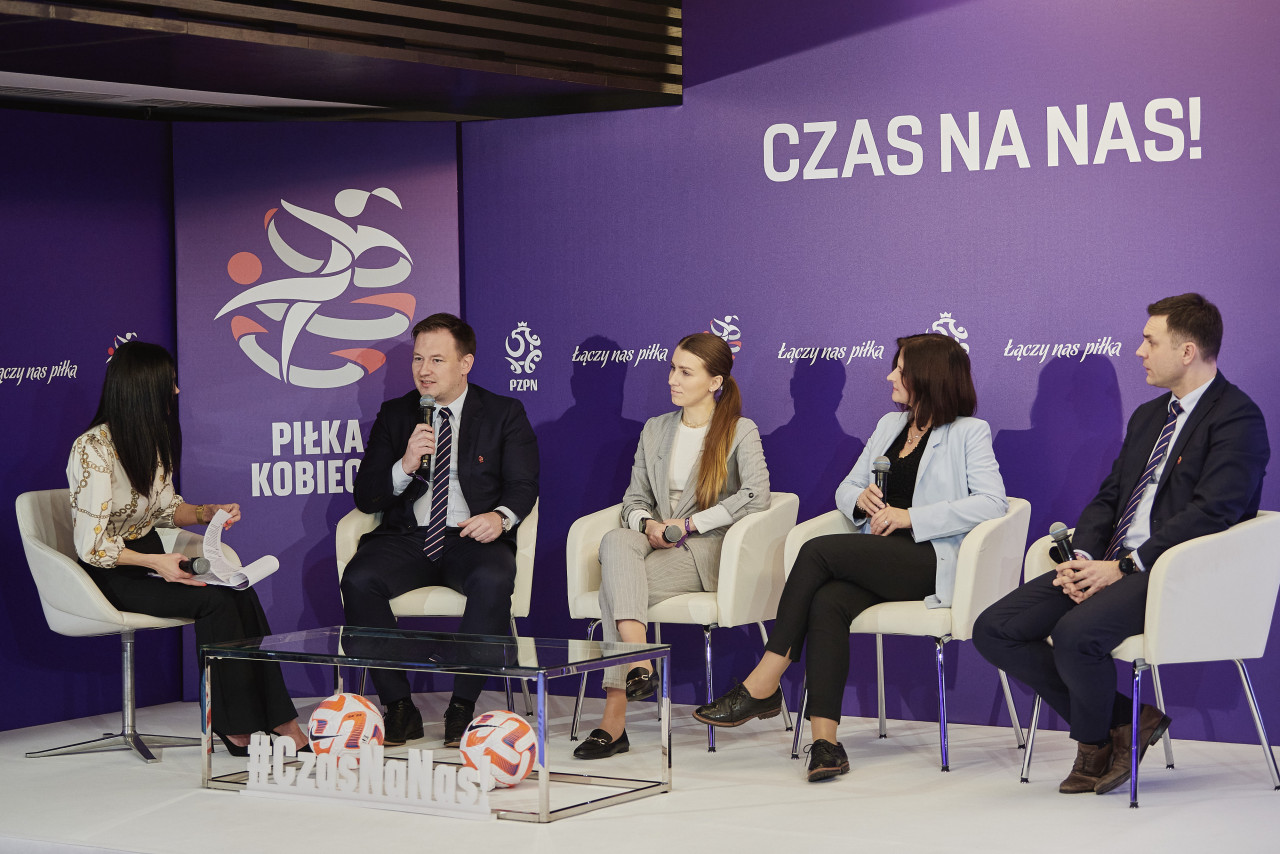
The second panel focused on professionalisation. It was attended by Łukasz Wachowski (General secretary of PZPN), Grzegorz Stefanowicz (director of the women's football department), Weronika Możejko (former footballer, now spokeswoman for AP Orlen Gdańsk) and Katarzyna Wierzbowska (former international referee).
"Until a few years ago we were struggling enormously, but fortunately this is changing. However, I believe that potential role models are still not visible enough in the mainstream media," said Możejko, who is the only spokeswoman for clubs at Orlen Ekstraliga level. From next season, employing a person to fill this position will become a licensing requirement. "By tightening the requirements of the licensing manual we are taking women's football to the next level. We achieve certain things much quicker than was the case in men's football. We need sustainable development because we are trying to build something long-lasting," Wachowski emphasised, and in support of these words Stefanowicz listed the projects and activities that are currently underway, which are also stages of professionalisation.
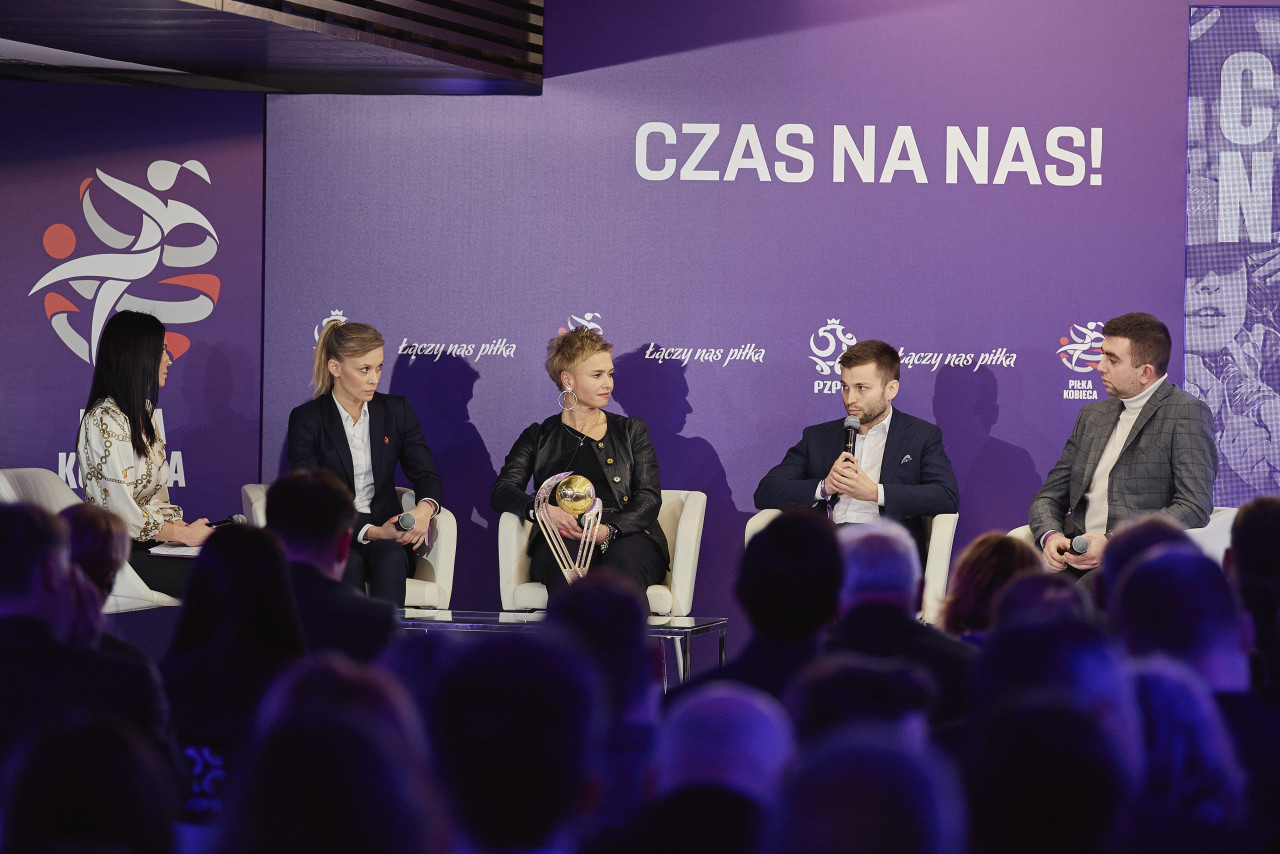
The third priority for women's football for 2022-26 is visibility and image. The panel was attended by Aleksandra Rosiak (director of the communication and media department of PZPN), Katarzyna Haczewska (a researcher from WeFind, which supported PZPN in the strategy and research process), Marek Szkolnikowski (director of TVP Sport), and Paweł Gołaszewski (a journalist from the weekly magazine "Piłka Nożna"), who entered the stage with... a statuette. "This is an award for Ewa Pajor - the best Polish female footballer in 2022 according to our weekly magazine. We have been awarding this statuette in this category for eight years, and we have already covered many stories of female footballers in our pages. A year ago, Paulina Dudek was even featured on our cover," explained Gołaszewski.
Female footballers are also becoming more visible on television. All Polish national team matches and one match of each Orlen Ekstraliga round are broadcast live on TVP Sport. "This is great exposure and opportunity. In terms of visibility and image, there is still a lot to be done, but this door is already wide open. Now all it takes is courage to go through it," said Szkolnikowski.
"The image of women's football is still not very clear. But this will change and, among other things, this strategy has been created to do so. Our research has shown that football is still perceived as a man's sport. We need to start with the groundwork to successively break this stereotype. There are many projects in the strategy that will help us achieve this goal," said Haczewska, stressing that education and awareness-building in the community will be key. She was backed by Aleksandra Rosiak: "We want to tell inspiring and exciting stories from the world of women's football more and more often and louder. It is important to influence parents and their perception of football in terms of girls' participation."
Thus, the discussion moved smoothly to the fourth area identified in the strategy.
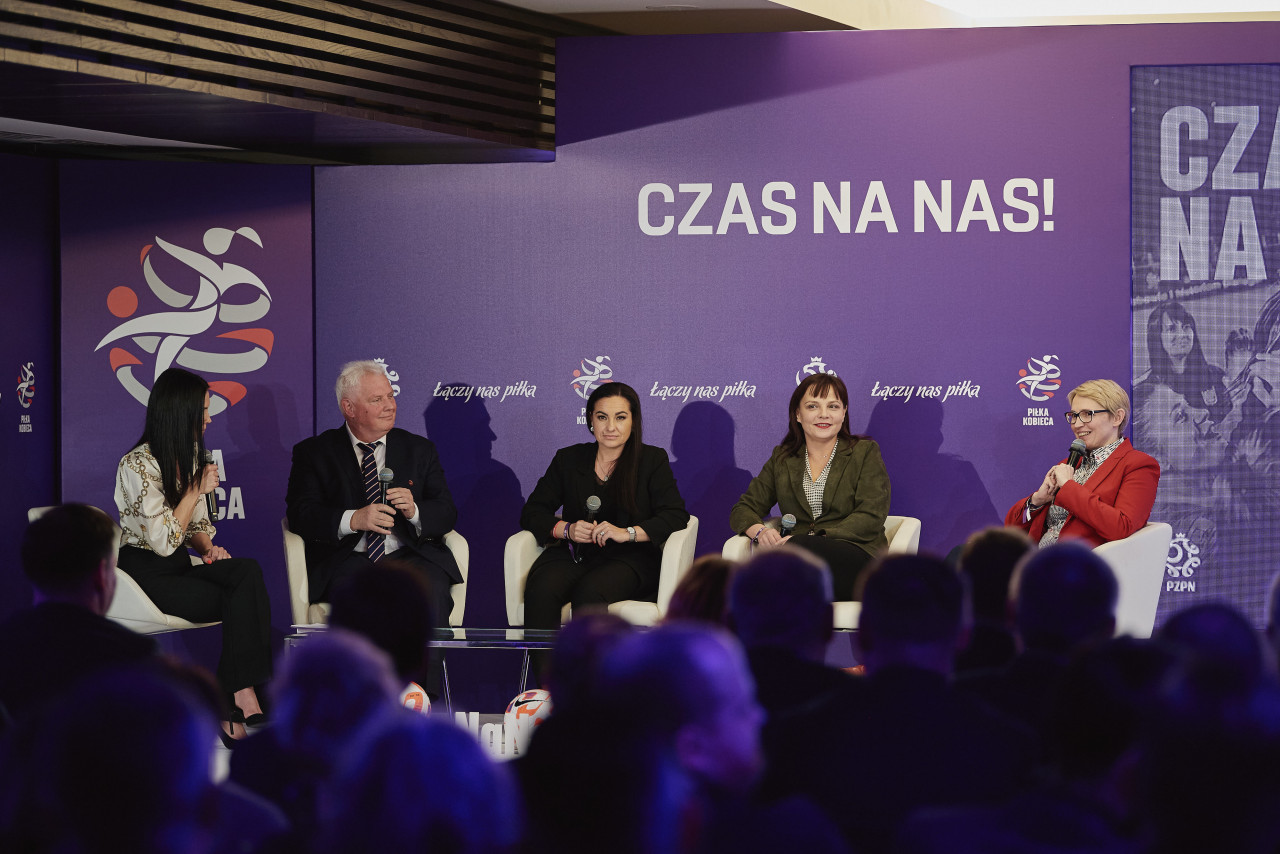
Nina Patalon (women's Polish national team head coach), Monika Grygorowicz (former Polish national player, Head of Women's Football Science Research Group in PZPN), Ewa Szmitka (footballer, coach and activist) and Zbigniew Bartnik (management board member of PZPN) were invited to discuss education and awareness.
In this section, panellists explained why it is so important to know the needs of women and girls. "Only then will we know what action to take to achieve our goals," Patalon stressed. "In the 1980s I was the only girl in my neighbourhood who wanted to play football. Initially I played with the boys, but later I was not allowed to do so. I left football for 25 years until one day, by complete chance, I came across a group of women playing just for fun in the park. I joined them and momentarily all the emotions from my childhood came back to me. They filled me, not for an hour or two, but for good. I started counting down the days until next Sunday and the next game. I soon got involved with football in other ways too, using my experience from other areas. I was able to use what I learned," said Szmitka, who periodically organises workshops for women working or wanting to get into football.
Nina Patalon gave a brief summary of Thursday's event: "We have the tools, the people, the passion and the ideas needed to move forward. I'm very happy because this meeting showcased not only the strategy, but many great women. In each panel we had representatives from children's football, grassroots, science area, coaches, coordinators, visionaries, media representatives. The event showed the human potential and how much women care about the development of football. There were also men who loudly declared that they were ready to support women's football."
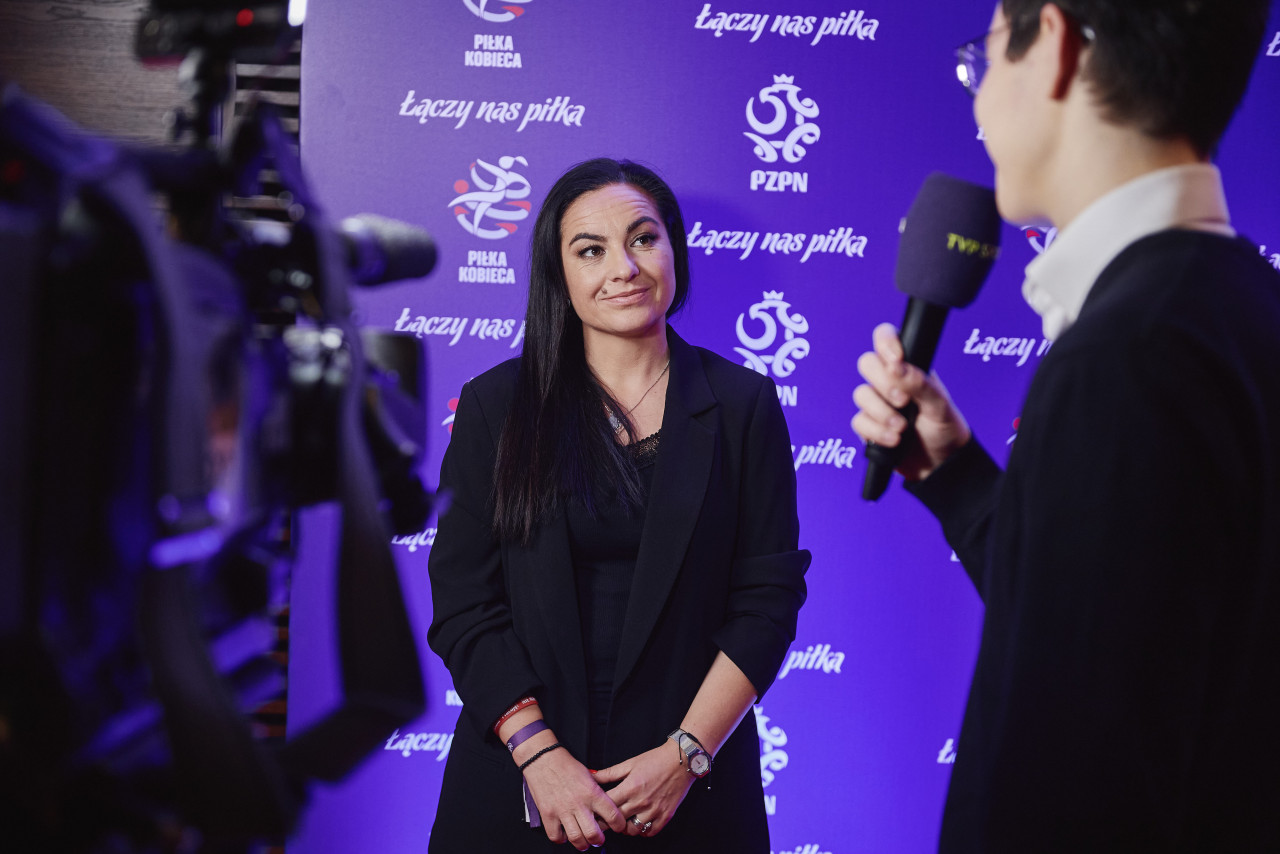
At the end of the official part of the meeting - different from any other at this type of event, as emphasised by Łukasz Wachowski, who spoke about the interaction between the panellists and the audience - it was time for the unofficial section: networking and backstage talks. "These are beautiful and touching moments. I have seen the great commitment of those responsible for preparing the strategy and the interest of the audience. You could feel that we were doing something great, which will bear fruit in the future," the secretary of PZPN summed up the event.
"National federations have their own plans and philosophies regarding women's football and its development. Poland is now among the countries that have a clear direction. It is very important for UEFA to be sure that each federation knows which way it wants to go, what its ambitions are. Having a plan is the only way to move forward," Emma Sykes concluded. "I am impressed with your strategy. A year ago I was in Poland talking about the very beginnings of this process. I can see how many stakeholder groups have been surveyed, how much work has gone into chalking out the four priorities of action. I really like the end result, as well as the organisation of today's event."
